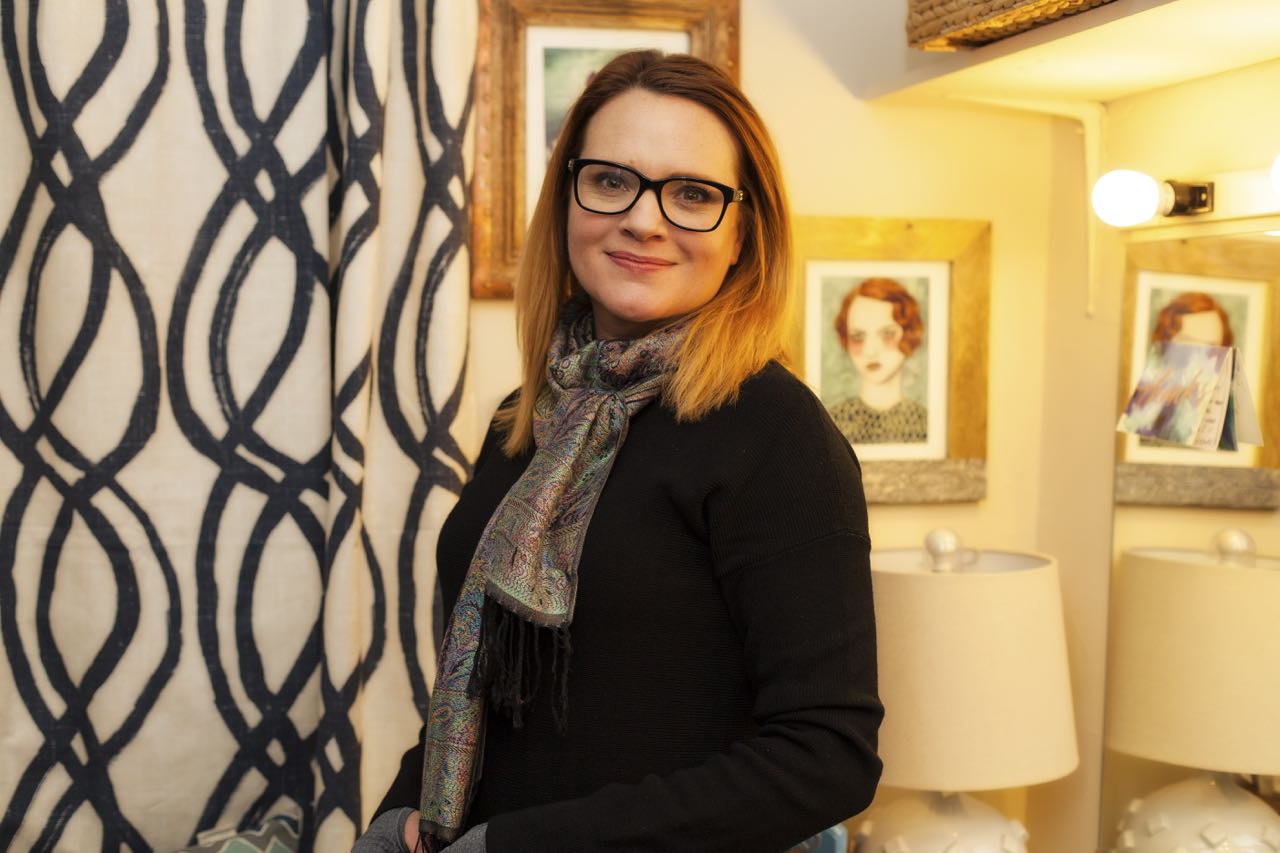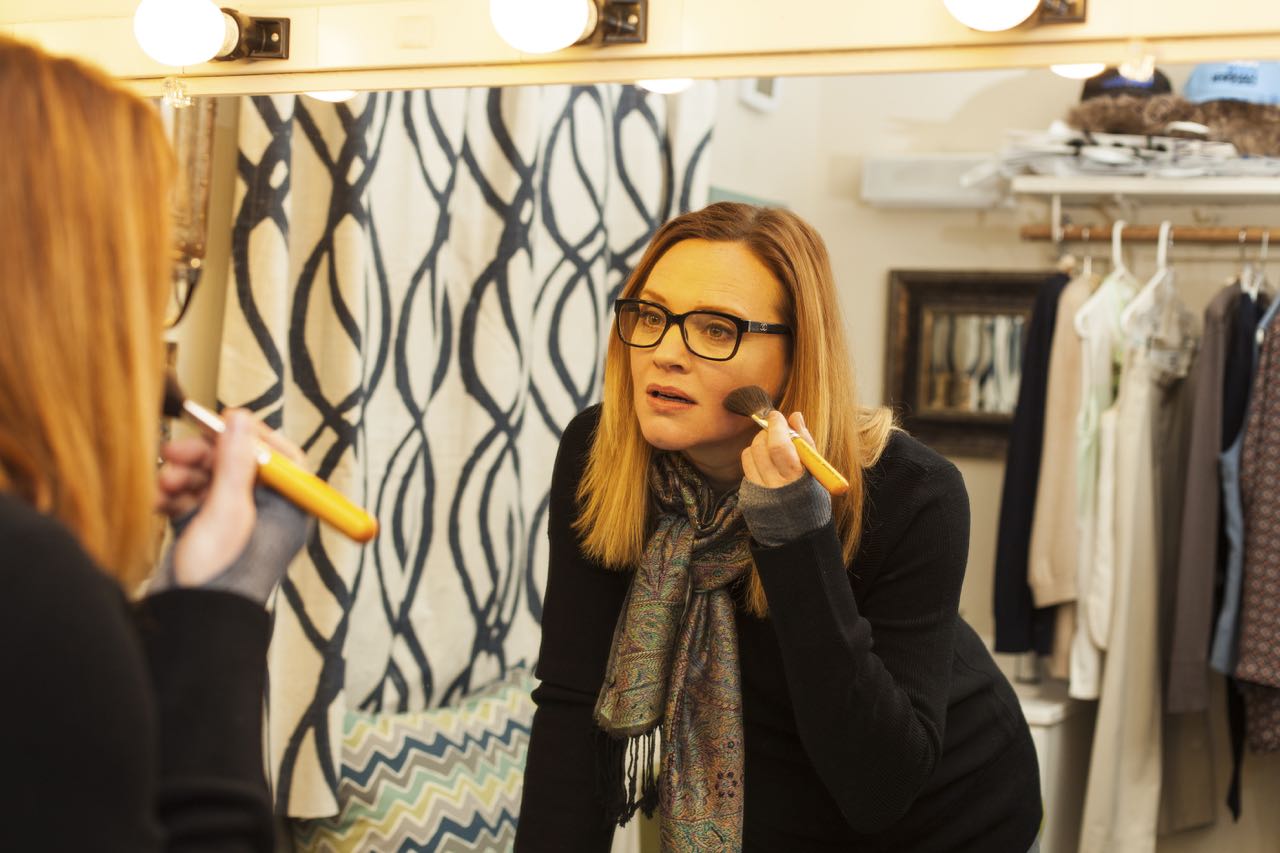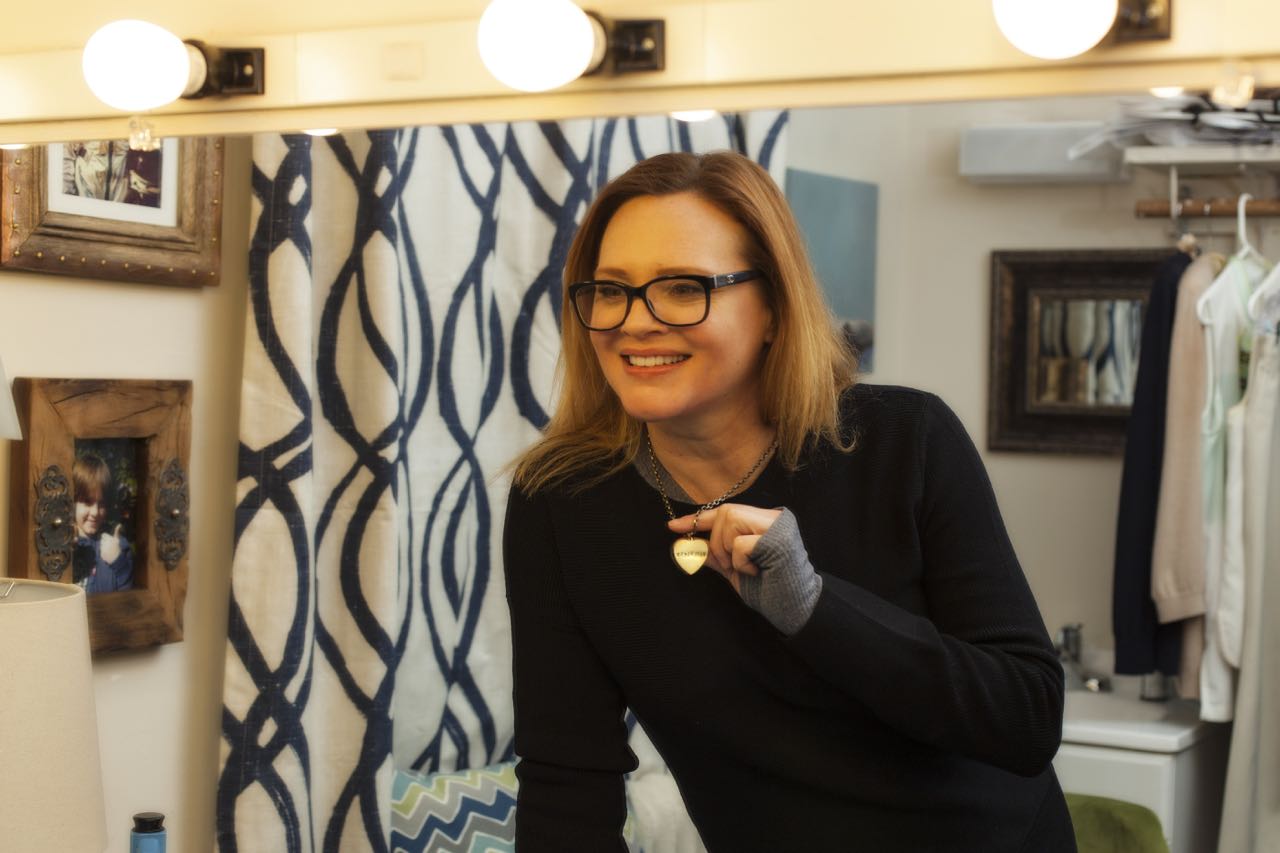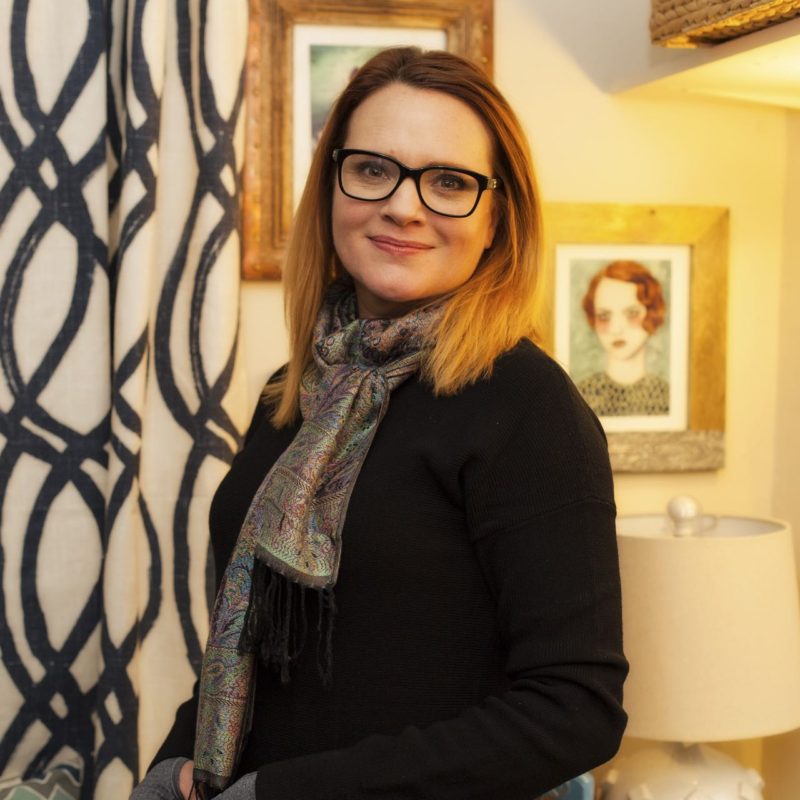Jennifer Laura Thompson on “Dear Evan Hansen”

Written by Victoria Myers
Photography by Jessica Nash
April 4th, 2017
The musical Dear Evan Hansen has become one of the hits of the 2016/2017 Broadway season. Part of the appeal of the musical is that it takes easily recognizable suburban archetypes and gives them depth and surprising twists. One such character is Cynthia, a mother whose son commits suicide and then finds herself enmeshed in Evan’s deceptions. Cynthia is played by actress Jennifer Laura Thompson. Jennifer made a splash in 2002 in Urinetown, for which she received a Tony nomination. She then replaced Kristin Chenoweth in Wicked, and most recently, prior to Dear Evan Hansen, appeared in Nice Work if You Can Get It. We recently talked with her about playing Cynthia, the role social media plays in Dear Evan Hansen, being a working mother, and more.
At the moment, what is the most interesting to you about Cynthia in Dear Evan Hansen?
I’m constantly struggling with her sense of redemption in the show. And it’s taken a while to come to the realization. Also hearing from audience members that they realize, without even seeing her in a scene, where she feels redemption. Over the course of the run of the show and the changes that have been made and the lines that have changed, it’s been so important to me that people get that aspect of her story. So that’s really hitting home right now because I’m hearing a lot from the audience members and I’m hearing a lot from peers and other friends of mine that they get her story. I was always afraid that was getting lost.
When you start working on a role, do you look for ways that the character’s similar to you? Different than you? None of the above?
Both. Definitely both. I think first I look for similar because if I’m working on the differences immediately, it’s the harder choice. And sometimes the differences are so difficult because you absolutely don’t agree with what that character’s choices are. But in this case, I feel, as a mother and a person in life, fully committed to what Cynthia’s committed to in her life. And for that reason, it’s very easy to slip into. I’ve met people like her. I’m a lot like her. And that made it very easy for me to put her fancy clothes on.
In the script, there are certain things that are left unsaid about the backstory, especially for your character and the relationship with her son. What was your process like, particularly working on that and figuring that out?
I relied a lot on my own experience as a mom and the struggles that a parent goes through. Initially, there was that frustration that it wasn’t spelled out. There was very little scene work before we’d suddenly lost our son. So I had to rely heavily on that before the principal scene where we reveal that we’ve lost him, which is a really hard job. I had to really process the whole thing, what’s going to get me to this moment of grievance, because it’s based on a relationship that Cynthia was completely devoted to, and it isolated her from her family because she and her husband disagreed on how to go about caring for their son, which is another thorn on the rose, because it was destroying their marriage and she was trying to save their son. So all of those things were thought long and heavy about. And now they’re just there, since I have been living with them for three years, and so it’s easier to access.
Did you actually create your own backstory?
Yeah, we all talked about where we’re from, what our lifestyle is like, where Larry and I met. And then we have the memories that were referenced within the show, so we have an idea of what kind of a lifestyle they had. They were never in need of anything. They always had a nice, seemingly perfect life that fell apart as Connor fell apart. And so it was not hard to imagine it because I’ve known those people who seem perfect on the outside and actually have a lot of problems that they don’t share with many people.
How did you balance that with then making Cynthia individual and surprising, but still play to the archetype of the suburban mom?
I think the circumstance is what makes it surprising. We rarely get to see those perfect people in difficult situations. And not only how they handle it in a public manner, but how they handle it within their households. You get to see the dissension between her and Larry, which you would probably never see at a golf outing or a barbecue. You would never see that, because they would never show that. So for that reason, it makes it realistic and human. And that’s what I love about all of the characters in the show: we’re all raw, even though we might seem archetypal. But we’re all very much not. We’re existing in a real reality.
You’ve been with the show for a while. Have you noticed that your relationship to the material has changed over time?
Yeah, it changed because as the show evolved, the scenes that once were very Cynthia-heavy changed to become Larry-heavy or Evan-heavy. And there was this backstory that is still a thread going through the play, but it isn’t being spoken [about] by me. So a lot of what I’m conveying is conveyed in silence and reaction, not with words. That’s the challenge of still telling the story within the story, without having the monologue that was stripped, or the song that was stripped. An entire song became a two-minute scene, but you knew that that two-minute scene enveloped a body of lyrics and thoughts, and so it’s my job to get it all in there. It’s challenging, but I think living with it for so long, it gets easier and easier. And at this point, of course, the show is frozen, so we know exactly where we’re at, what we can hold on to, and what we’ve lost and are allowed to let go of.

Are you one of those actors who really likes an audience, or do you like to do a lot of rehearsal?
I do love having the audience. There’s a point in the rehearsal room where you need to get out of the rehearsal room. Everybody’s seen it so much and now they’re changing little things that may or may not affect the greater good of the show. So it’s best at a certain point to get in front of other eyes and other ears to see how it’s bouncing off of them. Our first preview at the Arena was outstanding. The way the show was received down there was utterly astounding and beautiful. And honestly, I didn’t expect anything less. But I know that the writers were still biting their nails. They were very nervous about the material. I had felt very, very confident from the moment I read the script that this was a really important piece of work. And I wasn’t as nervous as they were about its reception. But I was surprised at Second Stage that we took our bow, went off-stage, went to the dressing rooms, and the audience was still applauding downstairs. And the stage manager was like, “Come back down! Come back down!” So we went back down. They wouldn’t stop applauding until we came back for another ovation. That was overwhelming.
Have you noticed a difference in reactions of audiences from D.C. to Second Stage to Broadway?
Not necessarily D.C. to here. That’s hard to compare. New York audiences are very different, and so I’m used to what we had at Second Stage and what we have at the Music Box. It’s never consistent. The consistency is, thankfully, the ovation we get at the end. The inconsistency is how they react, how uncomfortable they are, how they voice their discomfort. There are sometimes awkward laughs in moments where you know that a lie is being exacerbated by an action, and they’re applauding it in ways that you find shocking. Or they laugh during the principal scene when we hand the letter to Evan and say, “Our son wanted you to read this letter,” and the audience all knows that he wrote it. There’s a giggle there. And that’s one of those very difficult things, to hold onto the seriousness and the gravity of the situation for the parents in that scene and for Evan, because we have to stay locked in the reality of what this little meeting is about. And the audience is either uncomfortable or they’re giggly, or maybe they just laugh because they’re uncomfortable. And then sometimes there’s just a lot of audible weeping, which is, in a weird way, gratifying, but I also feel awful inside that I’m making somebody go through it.
Stacy Mindich mentioned that she’s noticed a pattern of people coming back with their parents.
We see people who come who tell us outside, “I’m going to bring my mom,” or “I’m going to bring my brother,” or “I’m going to bring my son.” And then I’ve watched and met the same people coming over and over again. And that’s what I love about it. It’s not a teen-centric musical. It’s a people-musical. It speaks to generations. And it speaks honestly and fully to all generations. We’re all flawed and we’re all going through our own story. And I feel like every story on the stage is important. That it’s not just about Evan. It’s about all of us interacting with each other and the struggles that we deal with and how we bounce off of each other. Obviously, it is Dear Evan Hansen, it is about him, but our journeys affect him greatly. And we all feel very strongly about telling our stories as well.
What other areas of culture affect your work? Visual arts?
Visual arts particularly. I was inspired to create a jewelry line for this show. I’ve always made it for myself, but I’ve sold occasionally in boutiques. And I was inspired by the show to make a jewelry line. [The show] deals with a distortion of social media and the feeling that it’s meant to make us all feel connected, but sometimes it backfires and makes us feel disconnected, or that we’re not as good as the rest of the social media users; that everyone [else’s] life is better than ours. I often go away feeling that after falling into a spiral of Facebook or Twitter. So this line was inspired by using social media phrases, but hand-stamping them in a very imperfect way to remind us that those phrases—”liked,” “loved,” “favorited”—really don’t mean anything, that we’re all imperfectly beautiful. And so I’m selling that at the merch booth. Textiles are a thing for me. I love painting, I love hands-on creativity.
How did you get interested in that?
I just grew up with that interest and that talent. And I always loved to draw. I played with Barbies, but I actually would rather build their house than play out the little scenes. I’m obsessed with miniature things that look lifelike.

When you’re doing a role, do you think of images that relate to the role?
No, not in terms of art, but fashion definitely. Depending on the role, sometimes I prefer to work outside in, because the outside is so very different than who I am. In this situation, it was inside out. But the clothing just sort of was the frosting on the cake. I’m very familiar with the clothes that she wears. I know what they cost, and these are her everyday wear. And it’s not something your average person could afford. And so I would say in terms of art or textiles, it’s that aspect. And music as well, like what music would she listen to? There’s a part of her that wants to feel connected to her son, so she tries to listen to what he listens to. She learns songs on the radio when she’s driving her kids to school because she wants to feel hip, but she still has her roots grounded in Fleetwood Mac and Steely Dan from college. She embarrasses her kids when she knows the words to 21 Pilots or tries to rap with Jay-Z. But she wants to be a part of it all. Some easy listening, maybe Lionel Richie. It’s just the whole gamut, because Cynthia spends a lot of time trying to be every woman. And then within that are the songs that she really loves to listen to, which is probably some Cat Stevens.
Speaking of social media, that’s one way the industry has changed a lot in the last decade.
This is the first show that I have been in where it has had such a huge impact on our fan base, and where our participation in it is important. I’ve never felt like my particular participation was important in the past. This has become so much more interactive. I have built a large number of fans just in the last two months that never would have known that I existed if I weren’t a part of Dear Evan Hansen. And I’m a part of that message, which is rewarding because, as a parent, I want every kid who feels like they have no one to not feel alone. I think the impact that this show has using social media is very different than what I’ve experienced with other shows. For example, we feature fan art on our website, and there’ll be different fan art featured in different ways. It’s like, we’re really including them, which is, I think, extraordinary. There are fans that now feel very connected to each of our characters. So this is more personal. And there is also a level of not wanting to cross a line, especially with delicate material where there are people who are potentially suicidal or are troubled and are reaching out to those of us who are not trained to deal with it. There’s a line to be drawn between becoming a mother figure to a total stranger without offering them real resources. So we’ve talked about that.
How do you find the balance in that?
Once we crossed a line where many of us were getting letters of people who had attempted suicide or were thinking about it or had lost a sister to suicide. It has to be addressed because not to address it is a disservice to the message of the show. But since we’re not trained professionals, we had to have a meeting about it. I got a message from a local person who had said that the song “You Will Be Found” came out the day after his best friend had committed suicide, and he felt like, if only that song had come out a day earlier, he might have heard that song and not done what he did. His community has used that song in the show to heal themselves. This was before we had the meeting, so I tweeted back and I said, “Heartfelt gratitude. I’m so deeply sad for your loss. I wish that he could have been there to discover what the message that we have to offer. But hold on to what we have to offer, because it’s important for everyone going forward.” I said as much as I felt like I could say. I felt grateful to have the opportunity to do that, to have the impact.
This is changing direction, but I wanted to ask you if there’s anything that you think the theatre community can do to make it easier to balance having a family while working in the theatre?
It’s a real challenge. We spend a lot of our money on day care and babysitting in order to do the work that sets us up for the work that’ll eventually pay off. Now there are agencies that are artist babysitting agencies. They specifically cater to [people in] the performing arts community who have erratic schedules. That’s one answer. Another answer is that inclusion of family in the theatre would be an acceptable thing. I think it’s an almost impossible question to tackle. But inclusion would somehow be the answer, I just don’t know how.
What do you find has been the most important thing in terms of how you’ve structured your career?
I followed my heart, for lack of a better word. I left when I felt like I was ready to have a child, which meant I left at sort of a high wave, right after my Tony nomination for Urinetown. I might have ridden that wave a few years longer, but I chose to listen to my heart and start a family. Wicked came along very quickly. [My son] was six months old. But the devastation of not being at home with my infant made it very rough, so I had to navigate over the next few years how I wanted to handle being a parent and performing. When I felt like he was ready, then I was ready to go back to work. But there’s never any right or wrong choice. You can imagine what you want it to be, and then you end up with a different set of circumstances than you expected, and you just have to navigate and listen to what your instincts are telling you. I look back and I think, “What if? What if I had waited another year?” I might have had more accolades, but in the end, it doesn’t matter. Life’s what you make it and I made it what it is. I’m so thrilled to be with this now, playing an age-appropriate woman—there’s not that many roles for us—so it’s come around.

